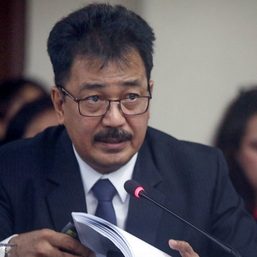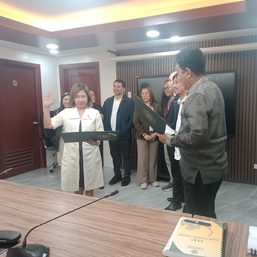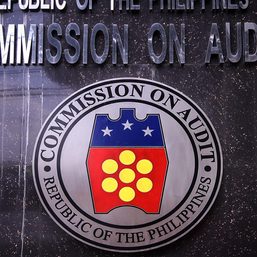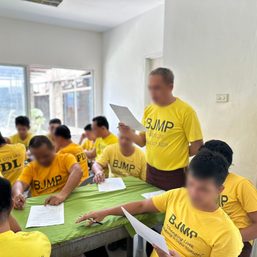SUMMARY
This is AI generated summarization, which may have errors. For context, always refer to the full article.

DAVAO, Philippines – Some 55.8% of Dabawenyos are dissatisfied with the government’s work on education, yet a majority still want their former mayor, Vice President Sara Duterte, to continue serving as education secretary, the results of a survey by the University of Mindanao-Institute of Popular Opinion showed.
The results of the survey, conducted from February 8-15, showed that only two of every 10 Dabawenyos were satisfied with the government’s response for quality education.
The respondents blamed the “dismal performance” on the Department of Education (DepEd) and the Commission on Higher Education (CHED).
Survey results showed that four of every 10 Dabawenyos support the mass promotion of pupils – or allowing them to proceed to the next grade – regardless of their performances.
Almost half of the respondents are in favor of making the National College Admissions test mandatory for college entrants as other Southeast Asian countries are implementing, the results also showed.
Yet, even as the survey results showed that most Dabawenyos were critical of the government’s work on education, 57.5% or about six of every 10 respondents want Vice President and concurrent Education Secretary Duterte to remain as head of the department.
The survey holds a margin of error of 2-3% with a 95% confidence level.
UM institute and publication deputy director John Vianne Murcia said the survey was conducted in response to the declining rank of the country in the Programme for International Students Assessment (PISA) for English, science, and math.
In the 2018 PISA results, the Philippines scored lowest in reading and comprehension and the second lowest in mathematics and science.
Released on December 3, 2019, the PISA results showed a score of 353 in mathematics, 357 in science, and 340 in reading – all below the average of participating Organization for Economic Cooperation and Development (OECD) countries.
Murcia said, “There is a dire need for the government to address the crisis in education, especially the impact of the COVID-19 pandemic on the education sector.”
Elsa Villanueva, the principal at the private school Assumption School of Davao, said the assessment could be used as a baseline for intervention programs.
In sample assessments, the skills in reading non-linear and non-print texts such as graphs, charts, and visuals are measured.
Villanueva said students must develop reading fluency in the formative years to be able to read with speed, accuracy, and proper expression that are important in developing comprehension.
“All teachers must be trained to teach reading as it is a basic skill that is done alongside other subjects. Teachers must also improve their mastery of basic concepts and problem-solving skills, particularly in non-routine problems,” she added.
Villanueva said distance learning, especially at the start of the pandemic, made it more difficult for students to learn math concepts, and there was no collaboration in problem-solving.
In DepEd’s Basic Education Report released in January, Duterte said Filipino learners were not academically proficient.
“Oftentimes, Filipino learners experience emotional abuse, and exhaustion. Some Filipino learners suffer from psychological fatigue. And being academically insecure, many of them failed to meet the standards of the demanding and competitive world,” she said.
She said these were caused and triggered by “conditions present at home, in our communities and even in our schools as a result of problems ingrained in our system.”
The Davao survey results were released as the Alliance of Concerned Teachers (ACT) said the learning crisis was rooted in the “long-time government neglect” of the education sector.
ACT said the “neglect” was reflected in severe shortages of infrastructure, learning resources, teaching, and non-teaching personnel.
As a result, “teachers are overworked, undersupported, and underpaid, and [it] has deprived access to education to millions of school-aged children and youth in situations of disadvantage,” ACT said. – Rappler.com
Lucelle Bonzo is an Aries Rufo Journalism fellow.
Add a comment
How does this make you feel?


![[ANALYSIS] The multiplier effect of negligence in education](https://www.rappler.com/tachyon/2024/04/The-multiplier-effect-of-negligence-in-education.jpg?resize=257%2C257&crop=277px%2C0px%2C720px%2C720px)

![[OPINION] Moving beyond blaming teachers: The call for regulatory deregulation](https://www.rappler.com/tachyon/2024/02/Moving-Beyond-Blaming-Teachers-The-Call-for-Regulatory-Deregulation.jpg?resize=257%2C257&crop=262px%2C0px%2C720px%2C720px)













![[The Slingshot] Red zipper on the mouth of Sara Duterte](https://www.rappler.com/tachyon/2024/04/TL-red-zipper-sara-duterte-april-12-2024.jpg?resize=257%2C257&crop=335px%2C0px%2C720px%2C720px)
There are no comments yet. Add your comment to start the conversation.